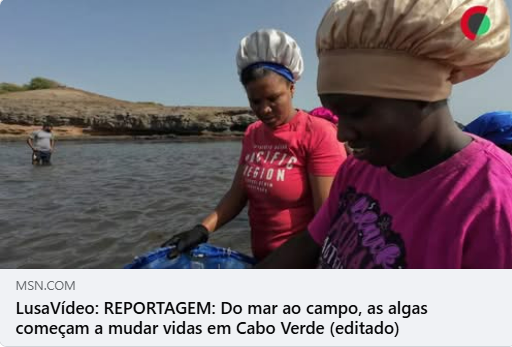
Seaweed biofertilisers for climate adaptation and women’s empowerment in Cabo Verde
Supporting women, livelihoods and resilience through the valorization of seaweed
Context
Since 2011, Caribbean and West African countries have suffered from deposits of millions of tons of brown seaweed (common name: sargassum), with 2023 seeing the largest deposits to date. Sargassum damages coralline communities, seagrass beds, and negatively affects tourism and fishing- two of the major income-generating activities in Cabo Verde.
Ulva sp. is a green seaweed growing on rocks in the intertidal zone. Ulva can accumulate in certain areas due to organic contamination of the seashore.
Many rural communities in Cabo Verde rely on agriculture and livestock as their major sources of income. However, poor soils, limited livelihood opportunities and drought create difficult challenges for development. In the context of climate change, efforts are needed to improve agricultural production, especially through the engagement of women, who experience climate and livelihood challenges differently than men, and who are often left behind when men migrate to find other sources of income.
This project explores the valorization of Ulva and Sargassum with a view to addressing these multiple challenges.
Aims and Objectives
Working together with rural women, the project trains groups of women in two rural communities on the hand-harvesting of seaweed. The harvested seaweed is dried, processed and tested for use as a safe and effective soil amendment for vegetable crops, in collaboration with local partners in Cabo Verde. The project will explore the potential for seaweed liquid bio-fertilizers, compost and mulch. These soil amendments can improve the quality of drought-affected soils, stimulate crop production, and reduce reliance on traditional fertilizers.
The project will also explore the potential for dried sargassum seaweed combined with recycled glass and plastic in the production of building bricks, as well as Ulva seaweed as a human food or additive to cosmetics.
Overall, these new opportunities will provide new business potential for rural women, while contributing to rural agricultural development and building resilience in the face of climate change.
The project aims to:
- Provide strong foundations for monitoring the socio-environmental and biodiversity impact
of sargassum events - Trigger new opportunities for women to diversify income streams within their communities
- Pilot the implementation of new sargassum and other seaweed management strategies in
communities - Target municipalities to integrate the findings into national natural resource management
strategies.
Outputs
The project was covered by Agencia Lusa, a Portuguese language media outlet in March 2025
Thierry Tonon - Department of Biology, University of York
Leonardo Gomez - Department of Biology, University of York
Lindsay Stringer - Department of Environment and Geography, University of York
Edita Magileviciute, CAPE VERDEAN ECOTOURISM ASSOCIATION - ECOCV
Bill and Melinda Gates Foundation
UniPiaget of Cabo Verde
INIDA, Cabo Verde
Ekonatura, Cabo Verde
Town Hall of São Domingos


